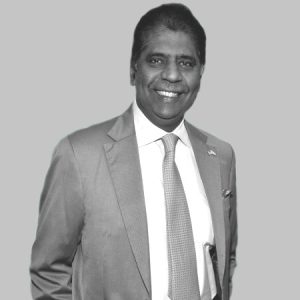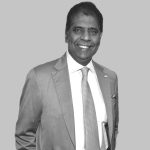
Vijay Amritraj
Guest is known for...
Vijay Amritraj was one of the most famous tennis players in the world, and was the top tennis player in Asia for 14 straight years.
In recent years, Vijay has become a leading tennis commentator for Fox Sports in the US and STAR-TV in Asia.
He was awarded the Padma Shri, India’s 4th highest civilian honour, in 1983.
Here's what I will learn...
In our conversation we spoke about his reflections on his journey till date. This included insights around tennis as a career, peak performance, role of resilience, how he thinks about coaching, how he thought about reinventing himself as his playing career was coming to an end, role of his family in him giving back to the wider society and much more.
LISTEN TO THE FULL CONVERSATION
From the Podcast
Vijay talks about how he took stock of life at key inflection points during his career in tennis and beyond. He also talks about the distinction between being pedigreed and learning from one’s own experiences through the journey of life. He also talks about how he dealt with the “Astronaut syndrome” (a phrase that Tony Robbins often uses). You have accomplished whatever you wanted to. Now what?
Vijay discusses how he has dealt with challenging moments when he was on court. He talks about navigating forks in the road where you often have to choose between low risk and decent outcomes and high risk with a potential of making it big. He shares an insight from Billy Jean King who says “Every challenge is an opportunity and pressure is a privilege”. He discusses the frame of mind with which one could approach such crucial moments.
Vijay reflects on how he transitioned to a new career as his family context changed and he approached the end of his active tennis career. He talks about how re-inventing yourself is often like throwing yourself in the deep end of the pool without knowing how to swim. Perspectives that could be relevant for leaders who are trying to re-invent themselves given significant shifts in the world of work and in personal circumstances.
Vijay talks about the role distinction between a Broadcaster and a Commentator. He also alludes to the challenge of catering to audiences with varying tastes and appreciation of the game. The challenge is in creating content that appeals to different segments and is not just tailored to the tennis aficionados. Vijay shares some thoughts around how broadcasters could draw audiences in and then keep them there because of the quality of the game.
Vijay discusses how less is more when you are interviewing a person. He discusses the role of brevity and the need for active listening to ensure that you are picking up the cues. He talks about some thoughts around how to navigate such a conversation. He uses the metaphor of Billiards where you are not just thinking about the initial contact of the cue ball with the red ball but are thinking two steps ahead of where all the cue ball might go.
Vijay talks about the role of effort in the context of long-term growth and development. People often get into a debate about whether it is nature or nurture and he makes a strong case for hard work through which people can often make up for significant deficiencies in talent. This is arguably all the more relevant in the world we live in where the half-life of the relevant of talent in a certain area is diminishing with the velocity of change around.
Vijay talks about the role of coaching at various stages of a person’s life and how as a person evolves, the coach that works with you to help you go to the next level might change. He also talks about how much can get accomplished through sheer will power using the fascinating example of Richard Williams who (with limited background in tennis) through his sheer resolve coached Serena and Venus to become world champions.
Vijay talks about the notion of “paying it forward” and how that attitude towards life got shaped in his early childhood given the influence of his family. He talks about how some of the things that his parents and relatives did when he was young have had a profound influence on how he goes about thinking about giving back to the wider society. He talks about a specific anecdote where he learnt a lesson about giving from his uncle.
In summary, Vijay talks about the role of passion and enjoying what you do in us producing our best work. He also alludes to a certain mindset with which we could approach life that will help in us playing to our personal potential. He refers to inspiration from Thurgood Marshall and Buzz Aldrin to talk about how we could approach life to ensure that we go as far as we can given the unique capabilities that each one of us has.
